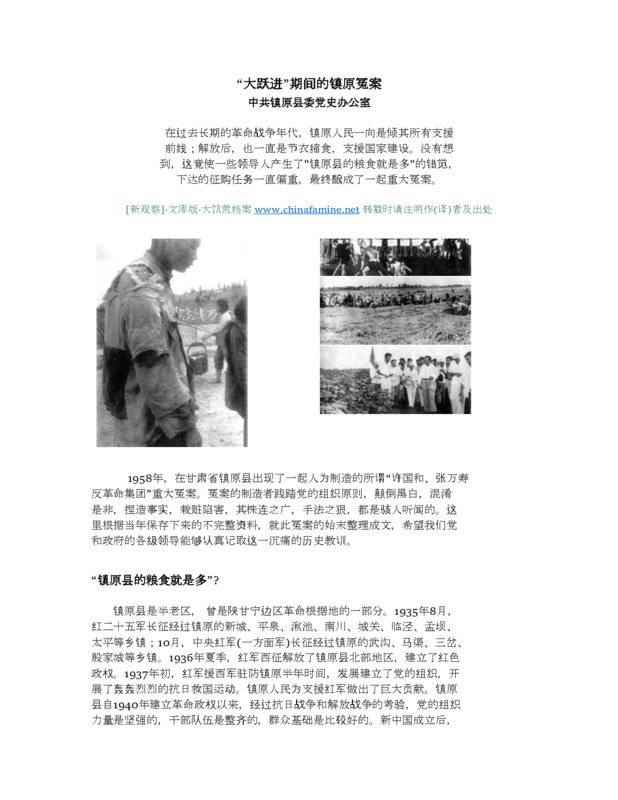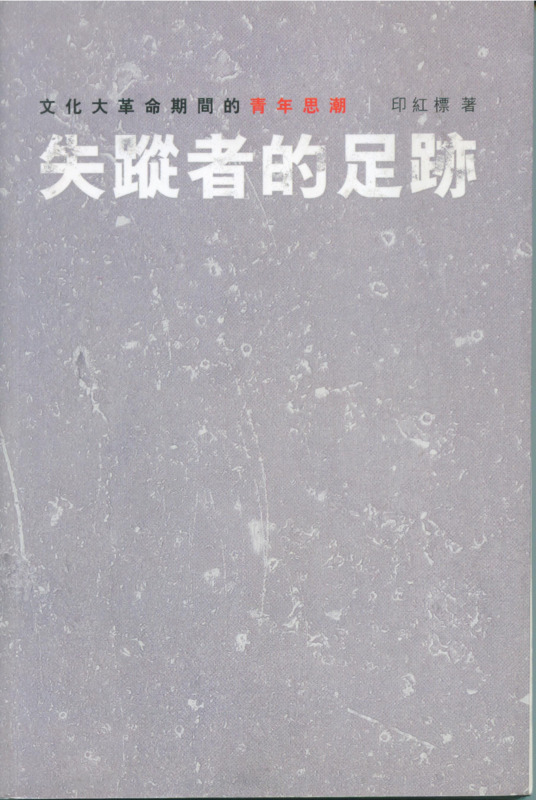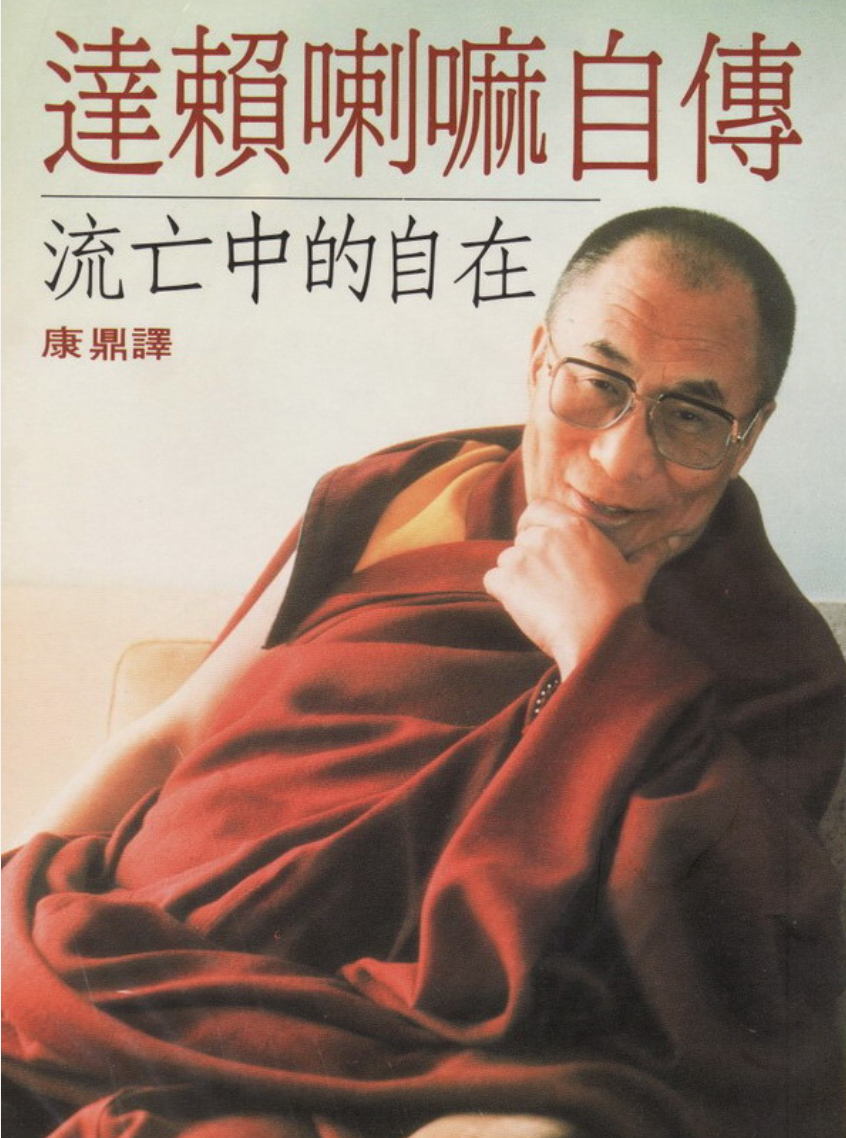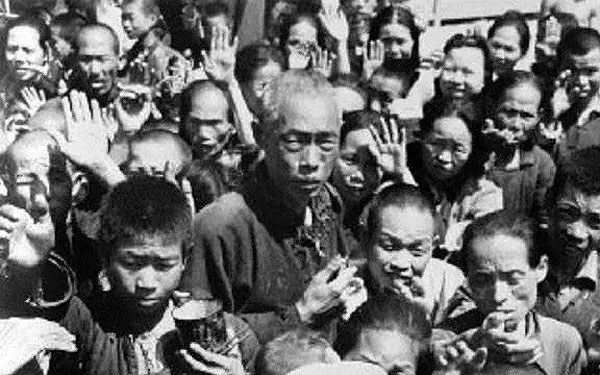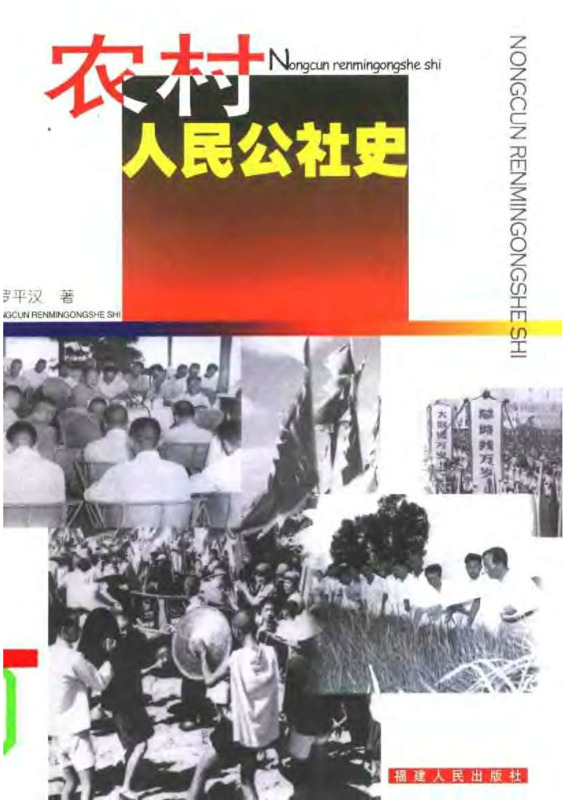Explore the collection
Showing 128 items in the collection
128 items
Article
Famine and Village: Who Starved Them to Death?
The author of this article, Chen Feng, was born in 1962. His hometown is Huang Sichong, Sanjia Brigade, Bainong Commune, Feidong County, Anhui Province. According to his records, in the winter of 1959 to the spring of 1960 during the Great Famine, his grandfather, grandmother, grandfather, grandmother's relatives and relatives, and countless members of his extended family and village, 57 people died of starvation.
Article
Famine in one County: Zhenyuan's Wrongful Case during the Great Leap Forward
The population in Zhenyuan County in Gansu was starving to death as early as 1957. However, the authorities believed that the food problem was due to "counter-revolutionaries" and created a huge case of injustice in which at least 1,650 people in the county were implicated. This article was published by the Zhenyuan Party History Office of the Communist Party of China (CPC) in *Hundred year tide* magazine. This article is reprinted from the "Famine Archives" website.
Book
Fifty Years of the Chinese Communist Party
The author Wang Ming was an early member of the Communist Party of China (CCP) and the first of the "28 and a half Bolsheviks," who lost power after the Yan'an Rectification and were gradually marginalized by Mao. After the Yan'an Rectification, the Internationalists, led by him, lost power in the party. He was gradually ostracized by Mao Zedong, who expatriated him to the Soviet Union in 1956. In his book, Wang Ming recounts his decades-long feud with Mao. It provides a fascinating insight into the early history of the CCP.
Book
First Man against the Cultural Revolution and His Co-Conspirators, The
On August 8, 1966, the Central Committee of the Communist Party of China adopted the "Sixteen Articles" of the Cultural Revolution. Soon after, Liu Wenhui, a young mechanic in Shanghai who had been labeled as a "rightist" in 1957, wrote pamphlets and leaflets clearly opposing the Cultural Revolution, the "Sixteen Articles", and authoritarianism and tyranny. He was arrested on November 26 of that year. Four months later, he was executed for "counter-revolutionary crimes." Liu Wenhui became the first person known to have been publicly shot for opposing the Cultural Revolution. The author of this book, Liu Wenzhong, was Liu Wenhui's co-defendant and survived thirteen years in prison. In this book, Liu Wenzhong describes in detail his brother Liu Wenhui's ideology as well as how he was killed by the tyrannical government.
Book
Footprints of the Missing: Trends of Youth Thought During the Cultural Revolution
During the ten years of the Cultural Revolution, ideological control was extremely harsh. However, a small group of young people at great personal risk still carried out extremely serious study and thinking.
This book is a study of this group of young thinkers. Written by Yin Hongbiao (b. 1951), a professor of history at Peking University, it examines the lives and motivations of some of these contrarian thinkers. Instead of focusing on well known thinkers from the Cultural Revolution, such as Yu Luoke, Professor Yin seeks to rescue "missing persons" from history. These are not mainstream public intellectuals, but grassroots thinkers who challenge the mainstream. In this book, they include people such as Chen Erjin, a young man from the mountainous province of Guizhou, who in 1976 published an essay "On Privilege" that proposed protection of human rights and a western-style separation of powers.
The book also allows us to understand the thinking of young people from the middle of the last century. As the critic Hu Ping noted in a review of this book (https://www.rfa.org/mandarin/pinglun/huping/hp-11302009095820.html):
"The 19th-century Russian thinker Herzen wrote: 'Can future generations understand and evaluate all the horrors and all the tragic aspects of our existence? ... Oh, let future generations linger on before we sleep under the tombstone, let us meditate and pay our respects; we are worthy of their respect!' Reading "Footprints of the Missing" written by Dr. Yin Hongbiao of Peking University reminds me of Herzen's words."
Book
Gan Cui: The Soul of Peking University-From Lin Zhao to the 1989 Democracy Movement
This book was originally published in the series *Micro Traces of the Past* - Documentary Volume - No. 6, edited by Huang Heqing, founded in 2007. Gan Cui, a student at Renmin University of China, was classified as a rightist in 1957. He became lovers with Lin Zhao, a rightist student who came from Peking University to work in the data room. Gan Cui was later sent to Xinjiang. When he returned, he learned that Lin Zhao had been killed. This book (in 140,000 words) is a manuscript of Gan Cui's memories of Lin Zhao in the context of the 1989 pro-democracy movement.
Official Documents
Great Famine in China, 1958-1962: A Documentary History, The
Feng Ke collaborated with Zhou Xun of the University of Hong Kong to collect information on the Great Famine. Zhou selected 121 items from the official archives to publish "The Great Famine in China, 1958-1962: A Documentary History." Many of the archives they accessed at the time have since been classified again and are not available.
Book
Gu Zhun and His Times
This book is about Gu Zhun, a Chinese economist, historian and philosopher. Gu Zhun was the first person to put forward the theory of China's socialist market economy, which became a key concept in the Reform era, helping to justify the use of markets in a socialist system. He also devoted himself to the study of politics, history and philosophy, translating several foreign classic works on economics and democracy and writing a large number of articles. Due to his independent thinking and dissent, he suffered repeated political persecution, including during the Anti-Rightist Campaign and the Cultural Revolution (for more information on Gu Zhun, see his biographical entry). As he personally experienced the Anti-Rightist Campaign, the Great Famine, and the Cultural Revolution, his diary is also considered a valuable source of information on these historical events. By documenting and analyzing his life, thoughts, and the eras in which he lived, Wang's book shows how Gu Zhun persisted in his "pursuit and search for the freedom and equal rights that are inherent to all human beings " (author's preface) in an era when independent thinking was suppressed. This book was published in 2015 by the Great Mountain Culture Publishing House in Hong Kong.
Book
Gu Zhun Diary
This book contains the only three surviving diaries of Gu Zhun: one from October 1959 to January 1960 when he was exile to work in a labor camp in Shangcheng, Henan Province, one from October 1969 to September 1971 when he was sent to work in the May Seventh Cadre School in Xi County, Henan Province, and one from October 1972 to October 1974 when he returned to Beijing. The first two diaries, written during the Great Famine and the Cultural Revolution, record the tragedies Gu Zhun witnessed during the Great Famine as well as his own endurance of hunger, and how he underwent repeated punishment and ideological education as a Rightist. The third diary is a simple record of his life, but it shows that Gu Zhun spent the last two years of his life almost exclusively in reading, translating and writing. Since he personally experienced the Anti-Rightist Campaign, the Great Famine, and the Cultural Revolution, these three diaries are considered a valuable source of information about these historical events. In addition to Gu Zhun's diary, the book includes Gu Zhun's translation manuscript of a chapter on Christianity in English political scientist George Catlin’s book *A History of Political Philosophers* published in 1939. The book also includes his last letter to his sixth brother Chen Minzhi, several articles by other people commemorating Gu Zhun, and interviews with Gu Zhun's close friends. The book was published by the Economic Daily Press in 1997.
Book
History of the Chinese Thought Movement
This book is a masterpiece by Chinese scholar Li Honglin. The author was a representative of the ideological liberation movement during reform and opening up and was arrested after the Tiananmen Square incident in 1989. This book summarizes the various ideological purges launched by the CCP since its establishment in 1949.
Book
History of the Rural People's Commune
The author of this book, Luo Pinghan, is a native of Anhua County, Hunan Province. He graduated from the Party History Department of Renmin University of China and served as director and professor of the Party History Teaching and Research Department of the Party School of the Central Committee of the Communist Party of China. This book was published by Fujian People's Publishing House in 2003.
The book is divided into nine chapters, narrating the history of the people's communes from the perspective of an orthodox view of historical development. The time nodes selected by the author include the rise, tide, adjustment, repetition, retreat, and disintegration of the Great Leap Forward. With Mao Zedong's affirmation, the system of people's communes was rapidly promoted across the country in 1958. At that time, the people's commune was both a production organization and a grassroots political power. Its rise and fanatical development are closely related to the subsequent Great Famine.
As a scholar within the system, the author’s view of history also belongs to the orthodox ideology. Although this book is narrated from the official ideology of the CCP, it uses rich and detailed historical materials to comprehensively and systematically introduce the history of the People's Communes, giving it a reference value for a comprehensive understanding of this movement.
Book
Holy Virgin on the Altar - A Biography of Lin Zhao, The
This book is a biography of Lin Zhao written by mainland writer Zhao Rui and published by Taiwan's Xiuwei Information Publishing House in 2008. The book describes Lin Zhao's life and family background in detail. The "Appendix" contains the recollections of several people involved.Purchase link: https://www.books.com.tw/products/0010431680.
Book
Hu Yaobang and the Vindication of Wrongful Convictions.
This book recounts Hu Yaobang's efforts to overturn people falsely accused of being "Rightists" during the Anti-Rightist Campaign of the 1950s. It is written by Dai Huang (1928-2016, formerly known as Dai Shulin), a Communist propagandist and later senior editor at the Xinhua News Agency, who was also persecuted in the Mao era and rehabilitated thanks to Hu's efforts.
This means that the book is not entirely objective–Dai does not analyze too closely Hu's history of slavishy following Mao's policies. Instead, he aims to capture the excitement felt by the hundreds of thousands who suffered in the Mao era and who were rehabilitated in the 1970s and '80s thanks to Hu. At 300,000 Chinese characters, or more than 200,000 English words, it is a weighty compendium that includes previously unreported details of famous public intellectuals and party members persecuted by the party and how Hu rehabilitated them. For example, Dai recounts the case of Ge Peiqi, who was a Communist Party spy who was toppled for his opposition to the party's corruption and privilege. Dai explains the case in depth and how Ge was eventually cleared.
Dai represented a liberal wing of the party that believed in the need for the party to address its mistakes. At his funeral people such as Du Daozheng (the editor of China Through the Ages 炎黄春秋) and Tie Liu (publisher of the alternative history journal 往事微痕) attended. The book also contains a preface by Li Rui, who participated in China Through the Ages and was also a mainstay of the party's liberal wing.
Book
In Search of Cannibal Witnesses
This book is part of author Eva's "Famine Trilogy." Because her mother was a survivor of the famine in Gansu, Eva has obsessively pursued and recorded that tragic history. She visited a dozen counties in Gansu and Shaanxi four times and interviewed two hundred and fifty people. The list of starving victims recorded in the book is about eight hundred and thirty, while as many as one hundred and twenty-one incidents of cannibalism and cannibalistic phenomena were recorded.
Book
In Search of Famine Survivors
This is the first book in author Eva's "Famine Trilogy," in which she traveled to Qin'an County, Tongwei County, and Tianshui District in Gansu Province as well as to Yaozhou and Tuxian County in Shaanxi Province in 2011. She interviewed more than two hundred survivors of the Great Famine, with the oldest person being ninety-five years old and the youngest being fifty-eight years old. This book allows these lowest class, mostly uneducated peasants to speak and provide their own witness, leaving behind their voices and oral history. Based on interviews with more than fifty interviewees, the book contains the names of more than five hundred victims and forty-nine incidents of cannibalism.
电影及视频
In Search of Lin Zhao's Soul
Hu Jie narrates the life of Lin Zhao, a Christian dissident who was condemned as a Rightist in the late 1950s and executed during the Cultural Revolution. Prior to becoming a mentcritic of the government, Lin Zhao was an ardent believer of communism. She demonstrated talent in writing and speaking as a star student in Peking University. However, after criticizing the government in 1957 during the Hundred Flowers Campaign, she was cast as anti-revolutionary. Despite the government’s attempts to silence her, Lin Zhao continued to speak and write publicly, including contributing two epic poems to Spark, an underground student-run journal. In 1960, she was arrested, and despite being released briefly in 1962, spent the rest of her life behind bars, under extremely poor living conditions. Nevertheless, she continued to write in prison, sometimes with her blood. In 1968, at the age of 36, she was executed by a firing squad.
In this documentary, Hu Jie showcases many of Lin Zhao’s surviving writings and poetry. These pieces often contain criticisms of the communist regime, as well as commentary on policy issues pertaining to labor and land reform. In making this film, Hu Jie traveled around China to interview friends and associates of Lin Zhao, who knew her as a student, activist, or prisoner. This documentary includes excerpts from interviews with them, which inform us about Lin Zhao’s personality and motivations.
This documentary has contributed to a widespread revival of interest in Lin Zhao, who had almost become a forgotten figure until the film’s appearance.
Book
In Search of My Homeland
“In Search of My Homeland” is a collection of essays in three volumes written by Gao Ertai during his exile abroad. In this book, Gao looks back on his life. From his hometown of Gaochun, a small town in Jiangsu Province, to Suzhou, then to Lanzhou, Jiuquan, Dunhuang, Beijing, Chengdu, and the United States, Gao has undergone tremendous suffering, lost his home and family, and finally had to go into exile in a foreign country. Even though the work is widely regarded as having great literary merit, Gao uses real names and places, which makes the work a valuable historical document, especially for describing the Great Famine, and the brutal suppression of intellectual life during the Cultural Revolution at the Dunhuang research academy, which is one of China's most prestigious cultural institutions.
In an [interview](https://web.archive.org/web/20240130211408/https://www.aisixiang.com/data/80804.html), Gao explained why he wrote the book: "Searching for my homeland is nothing but searching for meaning.... Life is short and small, and its meaning can only be rooted in the external world and in the long history. My sense of drift and meaninglessness, that is, a feeling that the world has no order, history has no logic, and the individual has no home, seems to be a kind of destiny. My writing is nothing but a resistance to this destiny."
In 2004, a censored version of the first two volumes of this book was published by Huacheng Publishing House in Guangzhou; in 2011, an updated version was published by Beijing October Arts and Literature Publishing House, but still censored. The version uploaded to our archive is the traditional Chinese version of the complete three volumes published by Taiwan INK Publishing House in 2009.
Book
In Search of the Fleeing Women and Children
This book is part of writer Eva's "Famine Trilogy." It is also the only oral history monograph on women and children who fled the famine in Gansu and Shaanxi from 1958 to 1963 as of now. More than 1.3 million people starved to death in Gansu Province, the hardest-hit area of the Great Famine, and more than 100,000 women between the ages of 16 - 15 years old fled the famine and left Gansu. What happened to them and their children is one of the most tragic memories of the Great Famine.

